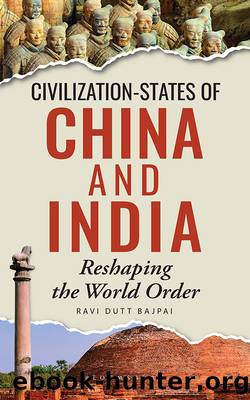Civilization-States of China and India by Ravi Dutt Bajpai;

Author:Ravi Dutt Bajpai;
Language: eng
Format: epub
Publisher: Bloomsbury UK
* * *
1 Ekkawalla: Horse cart driver, a colloquial term for an ordinary person.
6
The Capability of Civilization-States: ChinaâIndia and Nuclear Weapons
Introduction
In the context of inter-civilizational exchanges between China and India, the 1962 war is a minor blip; however, this war is an inflexion point for the two civilization-states. To the Chinese, this victory confirmed the primacy of material power over ideological and civilizational narratives; conversely, the Indians realized that a pompous ideological narrative based on civilizational entitlements was no substitute for material capabilities. Accordingly, both China and India focused on modern science and technology to develop material capabilities, overcome development deficiencies and enhance their international status. The unprecedented speed and scale of their material growth have enabled both China and India to emerge as significant global powers in the 21st century, an ascent that, somewhat ironically, has convinced the two Asian powers to re-assert their civilizational narratives as the mainstay of their foreign policy discourses.
The post-1962 period may be divided into two phases; the first one represents the period from 1962 until 2000, marked by the pursuit of real material power and capabilities, while the subsequent one heralds the return of civilizational narrative to the mainstream of foreign policy discourses. It is not that the pursuit of material power and the emphasis on civilizational narrative are mutually exclusive; instead, the two are mutually constitutive. On several occasions, the pursuit of material acquisitions is expressed in civilizational narratives, while, on others, the sense of civilizational entitlements drives the pursuit of greater material powers. However, the distinction between the two phases comes from the relative prominence given to material pursuits versus civilizational narratives in foreign policy discourses rather than the complete absence of one or the other.
This chapter examines the pursuit of material power, though its primary focus is on the evolution of the Indian nuclear programme. The chapter argues that Indiaâs nuclear journey is emblematic of Indiaâs own journey and destiny as a civilization-state. India is always seen as a ârising powerâ, which belongs to âthe class of countries that are always emerging but never quite arrivingâ (Kavalski 2012, p. 49). Eventually, if it does arrive at something, it realizes that the rules of the game have changed or the goalposts have shifted. Despite the 1974 peaceful tests and the 1998 nuclear weapon explosions, India could not claim the de jure status of ânuclear weapon stateâ; moreover, its conduct was considered âaberrantâ by the prevailing norms of international behaviour.
This chapter builds on the arguments offered in the earlier chapters that the Chinese and Indian national identity and foreign policy discourses are based on their self-perception as inheritors of a glorious civilization. Nehru believed that his nationâs economic backwardness was because âIndian civilization had abandoned scientific methods and rational inquiry for superstitionâ and that â[a] mastery of modern science was therefore vital if India was to catch up with the West and successfully become modernâ (Chacko 2011, p. 192). Moreover, Nehru asserted that India would be an ideal custodian of nuclear technology
Download
This site does not store any files on its server. We only index and link to content provided by other sites. Please contact the content providers to delete copyright contents if any and email us, we'll remove relevant links or contents immediately.
| Anthropology | Archaeology |
| Philosophy | Politics & Government |
| Social Sciences | Sociology |
| Women's Studies |
The Secret History by Donna Tartt(18253)
The Social Justice Warrior Handbook by Lisa De Pasquale(11967)
Thirteen Reasons Why by Jay Asher(8485)
This Is How You Lose Her by Junot Diaz(6469)
Weapons of Math Destruction by Cathy O'Neil(5867)
Zero to One by Peter Thiel(5513)
Beartown by Fredrik Backman(5376)
The Myth of the Strong Leader by Archie Brown(5252)
The Fire Next Time by James Baldwin(5037)
How Democracies Die by Steven Levitsky & Daniel Ziblatt(4975)
Promise Me, Dad by Joe Biden(4918)
Stone's Rules by Roger Stone(4877)
100 Deadly Skills by Clint Emerson(4708)
A Higher Loyalty: Truth, Lies, and Leadership by James Comey(4570)
Rise and Kill First by Ronen Bergman(4557)
Secrecy World by Jake Bernstein(4414)
The David Icke Guide to the Global Conspiracy (and how to end it) by David Icke(4407)
The Farm by Tom Rob Smith(4336)
The Doomsday Machine by Daniel Ellsberg(4257)
